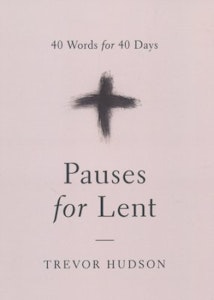 Excerpt from Pauses for Lent
Excerpt from Pauses for Lent
When his family heard it, they went out to restrain him, for people were saying, “He has gone out of his mind.” And the scribes who came down from Jerusalem said, “He has Beelzebul, and by the ruler of the demons he casts out demons.” And he called them to him, and spoke to them in parables, “How can Satan cast out Satan? If a kingdom is divided against itself, that kingdom cannot stand. And if a house is divided against itself, that house will not be able to stand. And if Satan has risen up against himself and is divided, he cannot stand, but his end has come. But no one can enter a strong man’s house and plunder his property without first tying up the strong man; then indeed the house can be plundered. —Mark 3:21 – 27
Overcoming evil is an essential ingredient in the life of Jesus. Not only does he conquer evil in the midst of personal temptation, but he also constantly wrenches men and women free from malignant evil whenever it manifests itself in human suffering and pain. Jesus, according to the New Testament writers, is the Divine Agent sent into this world to liberate human beings from the bonds of evil in its many different forms.
Not surprisingly, as we see in our reading, his opponents don’t like this. They accuse him of being in league with the demon Beelzebul. Even at this very early stage in Jesus’ ministry, naysayers are already looking for a reason to do away with him. Gospel-writer Mark wants to show that the shadow of the cross is beginning to fall across Jesus’ life long before the events of Golgotha.
But Jesus responds differently to his opponents’ tactics. He refuses to respond to evil with the weapons of evil. He simply points out that their accusations are not logical. If Satan is driving out Satan, then the Evil One is fighting against itself. Instead, Jesus overcomes evil and brings God’s kingdom of freedom to all who are held captive by its dark powers.
How do we share in this victory today? We can face the darkness within our lives honestly and name it for what it is. We can confess our complicity in the societal evils around us. We can call out for the crucified and risen One to deliver us. We can take action against the injustice around us. Most of all, we can keep on demonstrating the power that is stronger than evil: the power of self-giving and crucified love.
Hudson, Trevor. Pauses for Lent: 40 Words for 40 Days. Upper Room Books. Kindle Edition. Used with permission.
Photo by Jongsun Lee
Text First Published January 2015


